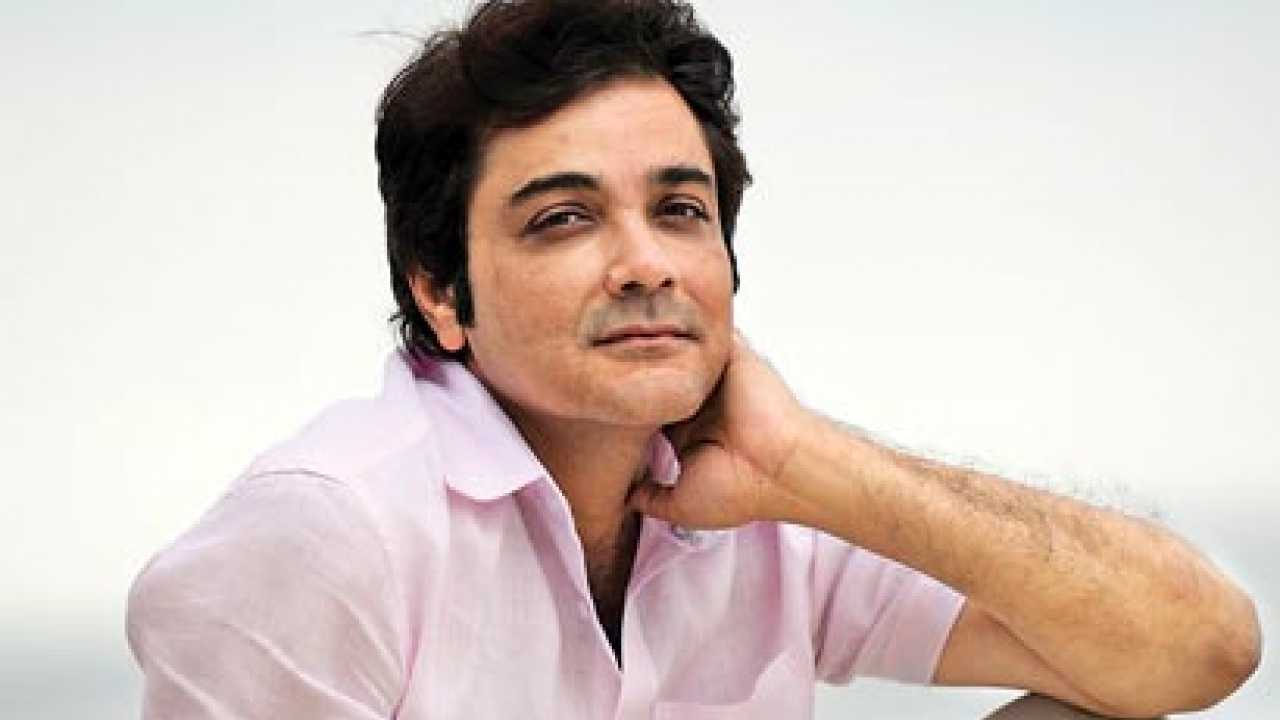
Prosenjit Chatterjee has been Bengali cinema’s biggest star for close to two decades now. After a false start in Bollywood in the ’90s, he now plans to make the most of his “45 to 55” years as an actor of repute in both Tollywood and its Mumbai counterpart, the star tells Deepanjana Pal.
Prosenjit Chatterjee is in “the most critical crisis time” in the life of a filmstar. He’s a veteran of 324 films. For years, he has almost single-handedly kept the Bengali film industry alive by delivering pulpy box-office hits. It’s been more than 20 years in show business for him. This is usually when an actor is replaced by younger heroes. Chatterjee, however, not only remains a superstar in Bengal but he’s also reinvented himself and, with his portrayal of Dr Ahmedi in Shanghai, reintroduced himself to Bollywood as an intelligent actor.
Chatterjee carries his age lightly, whether it’s in his portrayal of a Rowdy Rathore-inspired cop in the Bengali film Bikram Singha or as part of the acting ensemble in Shanghai. “They feel like I’m their older brother,” Chatterjee said of his relationship with younger co-actors. “Like, there was an interview with Yami (Gautam, actor), in a Kolkata newspaper and she said, ‘I want to work only with Prosenjit.’ I started tweeting [to the younger actors who are his friends]: ‘You still can’t beat Bumba-da!’”
Some actors may shy of making their age or nickname public, but not Chatterjee. He’s as proud of being known as Bumba (with a “da” because he deserves the respect given to an elder brother) as he is of being 49 years old in 2012. “It’s time for a Bengali comeback,” he said, referring to the recent successes of Sujoy Ghosh (Kahaani), Shoojit Sircar (Vicky Donor) and, of course, Dibakar Banerjee (Shanghai).
“I’m touching 50 and I’m sure this is going to be the best period of my career. When books and documentaries are made on me, I want to tell my next generation: don’t get stuck in that typical thing of a hero dancing and singing. Enjoy that success and then you’ll get more.”
It may sound presumptuous for an actor who had an important but bit part in Shanghai to present himself as one whose life should be chronicled, but Chatterjee is a superstar. Having begun as a child actor, his career really took off in 1986 with Amor Sangi. Since then, Chatterjee has been Bengali cinema’s most reliable hero, making producers, young men and women of all ages go weak at the knees.
Despite being the son of the actor Biswajeet, who had a limited run in Bollywood and was never able to pip Uttam Kumar from the top spot in Bengal, Chatterjee’s entry into cinema didn’t follow the usual trajectory of a star son. When Chatterjee was 16, his parents divorced and Chatterjee kept little contact with his biological father. “I started by doing theatre when I was only 16 or 17,” said Chatterjee. “My entire career graph went like that of a newcomer who would take one, one, one step,” said Chatterjee, gesticulating to show the rungs of the imaginary ladder he’s climbed to reach where he is now.
Bengal's bankable hero
Listen to Chatterjee and it seems as though he made every advancement in Bengali cinema possible. While his claim that he brought Cinemascope to Bengal may not be entirely accurate, the actor has played an important part in Tollywood’s revival. “When I joined, it was in very bad shape,” he says. “I always say, we who worked then, we were the warriors.” Some of Chatterjee’s films certainly are an assault, but more upon good taste. Shoshurbari Zindabad, Baadshaah, Mon Maane Na are just a few films from his extensive filmography that have cemented Chatterjee’s status as the one hero whose market has not faltered over two decades.
In the 1990s, few would have imagined the same actor would also be responsible for more experimental cinema finding a market in Bengal. After appearing in a number of Rituparno Ghosh’s films from 2000 onwards, including Chokher Bali and Dosar, Chatterjee became the star that young directors could count on if they had a good script.
It’s been a calculated move on Chatterjee’s part to ensure he has a respectable career. “The critical time is from 45 to 55,” he said. “Everybody will come to that point. You can’t fight against your time. It has to go. So one day I thought, this 45 to 55, I have to make the best career of my life.” The way to do it was to prove his credentials as an actor. For example, in 2010 he played the part of a baul singer in Moner Maanush, directed by the acclaimed director Gautam Ghosh. “For Moner Manush, I gave nine months,” Chatterjee recounted. “I left my office, my family, I started staying in jungles. I ate vegetarian food, I used to sleep on the ground. Everyone told me, your eyes were not looking like you’re a normal person.”
In comparison, Shanghai was far less intensive. Working with sync-sound, a first for Chatterjee, made it imperative that Chatterjee work on his Hindi. “I did my homework,” he said. The praise his performance has received has helped soothe the sting of Aandhiyan, the 1990 David Dhawan-directed flop that marked Chatterjee’s Bollywood debut.